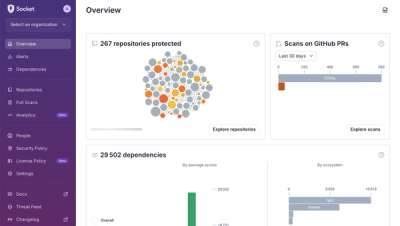
Research
Using Trusted Protocols Against You: Gmail as a C2 Mechanism
Socket uncovers malicious packages on PyPI using Gmail's SMTP protocol for command and control (C2) to exfiltrate data and execute commands.
REMOTE_USER Authenticator: An Authenticator for Jupyterhub to read user information from HTTP request headers, as when running behind an authenticating proxy. Based on https://github.com/cwaldbieser/jhub_remote_user_authenticator and https://github.com/rasmunk/jhub-authenticators
.. image:: https://travis-ci.org/cbjuan/jhub_remote_login.svg?branch=master :target: https://travis-ci.org/cbjuan/jhub_remote_login
Authenticate to Jupyterhub using an authenticating proxy that can set the Remote-User header. Also supports for passing additional information to the jupyter user. This includes a list of user defined /data headers.
This type of authentication relies on an HTTP header, and a malicious client could spoof the REMOTE_USER header. The recommended architecture for this type of authentication requires that an authenticating proxy be placed in front of your Jupyterhub. Your Jupyerhub should only be accessible from the proxy and never directly accessible by a client.
This type of access is typically enforced with network access controls. E.g. in a simple case, the host on which the Jupyterhub service accepts incoming requests has its host based firewall configured to only accept incoming connections from the proxy host.
Further, the authenticating proxy should make sure it removes any REMOTE_USER headers from incoming requests and only applies the header to proxied requests that have been properly authenticated.
This package can be installed with pip either from a local git repository or from PyPi.
Installation from local git repository::
cd jhub_remote_login
pip install .
Installation from PyPi::
pip install jhub-remote-login
Alternately, you can add the local project folder must be on your PYTHONPATH.
You should edit your jupyterhub_config.py config file to set the
authenticator class::
c.JupyterHub.authenticator_class = 'jhub_remote_login.RemoteUserAuthenticator'
You should be able to start jupyterhub. The "/login" resource will look for the authenticated user name in the HTTP header "Remote-User". If found, and not blank, you will be logged in as that user.
Alternatively, you can use RemoteUserLocalAuthenticator::
c.JupyterHub.authenticator_class = 'jhub_remote_login.RemoteUserLocalAuthenticator'
This provides the same authentication functionality but is derived from
LocalAuthenticator and therefore provides features such as the ability
to add local accounts through the admin interface if configured to do so.
Provides an option for testing JupyterHub authentication with a dummy authenticator that can have a global preset password for any account::
c.JupyterHub.authenticator_class = 'jhub_remote_login.DummyAuthenticator'
c.DummyAuthenticator.password = 'password'
Note! Don't use in production.
Provides the capability to supply the jupyterhub user with additional state information via the /data path. This adds two base request paths to the jupyterhub web application::
'/login' -> requires a non empty Remote-User header '/data' -> requires both an authenticated request and a valid configured header
Before information can be passed to the user via the '/data' path, a list of valid headers is required. These preset valid headers are then upon a POST request to the '/data' URl appended to the current authenticated jupyterhub user data dictionary. I.e. user.data[Header] = HeaderValue
The extended authenticator can be activated by setting the following option in the jupyterhub config file::
c.JupyterHub.authenticator_class = 'jhub_remote_login.DataRemoteUserAuthenticator'
# Making 'State' a valid header to pass to /data
c.DataRemoteUserAuthenticator.data_headers = ['State']
Beyond providing the custom header possibility, the authenticator also by default
encodes the Remote-User header with 'b32encode'. The authenticator therefore also provides
the possibility of storing the actual value for debugging purposes in the user.real_name
variable via the jupyterhub auth_state mechanism of passing information to
the spawner as noted at Authenticators <https://jupyterhub.readthedocs .io/en/stable/reference/authenticators.html>_.
FAQs
REMOTE_USER Authenticator: An Authenticator for Jupyterhub to read user information from HTTP request headers, as when running behind an authenticating proxy. Based on https://github.com/cwaldbieser/jhub_remote_user_authenticator and https://github.com/rasmunk/jhub-authenticators
We found that jhub-remote-login demonstrated a healthy version release cadence and project activity because the last version was released less than a year ago. It has 1 open source maintainer collaborating on the project.
Did you know?

Socket for GitHub automatically highlights issues in each pull request and monitors the health of all your open source dependencies. Discover the contents of your packages and block harmful activity before you install or update your dependencies.

Research
Socket uncovers malicious packages on PyPI using Gmail's SMTP protocol for command and control (C2) to exfiltrate data and execute commands.

Product
We redesigned Socket's first logged-in page to display rich and insightful visualizations about your repositories protected against supply chain threats.

Product
Automatically fix and test dependency updates with socket fix—a new CLI tool that turns CVE alerts into safe, automated upgrades.